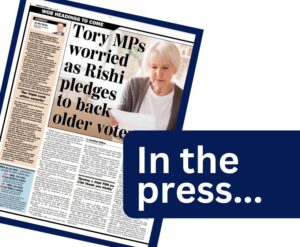'Keep your hands off our pensions' warning as rise of £478 predicted
An inflation rate of 4% could leader to a £478 pension increase as many older people struggle with the cost of living
By Jonathan Walker, Whitehall Editor
Published 8th August 2025 via express.co.uk
Politicians have been warned to “keep their hands off” the triple lock after predictions that soaring inflation could lead to a £478 increase in the state pension.Financial experts said the potential 4% rise would raise questions about the affordability of the triple lock policy, following suggestions from the International Monetary Fund and think thank the Institute for Fiscal Studies that it may need to be scrapped.
But organisations backing the elderly said the triple lock, which the Express is campaigning to keep, is vital in order to reduce poverty and help pensioners cope with soaring bills for food, council tax, water and more. Dennis Reed, Director of Silver Voices, said: “A rise of 4% is barely keeping up with the cost of living.”
A report by the Bank of England predicted the CPI rate of inflation in September could be 4%, double the target rate of 2%. The triple lock ensures pensions rise in line with inflation, average earnings or by 2.5%, whichever is higher, and if the prediction is correct then those receiving the full new state pension can expect an increase of £478 or more.
However Mr Reed pointed out that many older people do not receive the full amount, or are on a less generous state pension scheme. He said: “They are getting by on a subsistence income and 4% of very little is still very little.”
Pensions will be in the spotlight in the run up to Chancellor Rachel Reeves’s Budget in November, according to Laith Khalaf, head of investment analysis at finance firm AJ Bell. He said: “Pensioners have something to cheer in the latest set of forecasts from the Bank of England, which predict inflation will peak at 4% in September.
“It’s possible that wage growth may trump inflation, and pensioners get an even bigger bump in their income. But if the Bank of England is right about inflation, then pensioners can look forward to a rise of at least 4% in their state pension next year.
“No doubt this will once again raise questions about the fairness of the triple lock, especially against a fiscal backdrop which suggests the chancellor is going to have to stick a shovel into taxpayers’ pockets again in the autumn Budget.”
Eamonn Donaghy, spokesperson for campaigners Later Life Ambitions said, “Politicians and policy researchers need to keep their hands off the triple lock.
“It is all that stands between many pensioners and a level of poverty that nobody deserves or ought to have to live with, especially after most have worked and contributed throughout their lives.
“It’s a policy that has been a great success since it’s introduction in ensuring some of the UK’s most vulnerable people can live with dignity.
“Even if these predictions come true, we are only talking about an increase of about £9 per week and our state pension will still remain among the most stingy in Europe.
“And we all know that the cost of basic essentials like food and energy regularly outstrip the headline inflation rate.”
The IMF has warned that the triple lock “could be replaced with a policy of indexing the state pension to the cost of living” to help the Chancellor avoid breaking her pledge not to increase taxes on “working people”.
Think tank the Institute for Fiscal Studies last month said that pensions should increase in line with average earnings, and said the triple lock “increases the value of the state pension in an unpredictable way”.
Later Life Ambitions
Later Life Ambitions, or the LLA, is formed of three founding organisations, CSPA, NARPO and NFOP.
We all share the same goal of ensuring that the voices of those in later life are heard, in 2014 we joined forces to form Later Life Ambitions.
For the past decade we have campaigned for the rights of pensioners across the UK.




